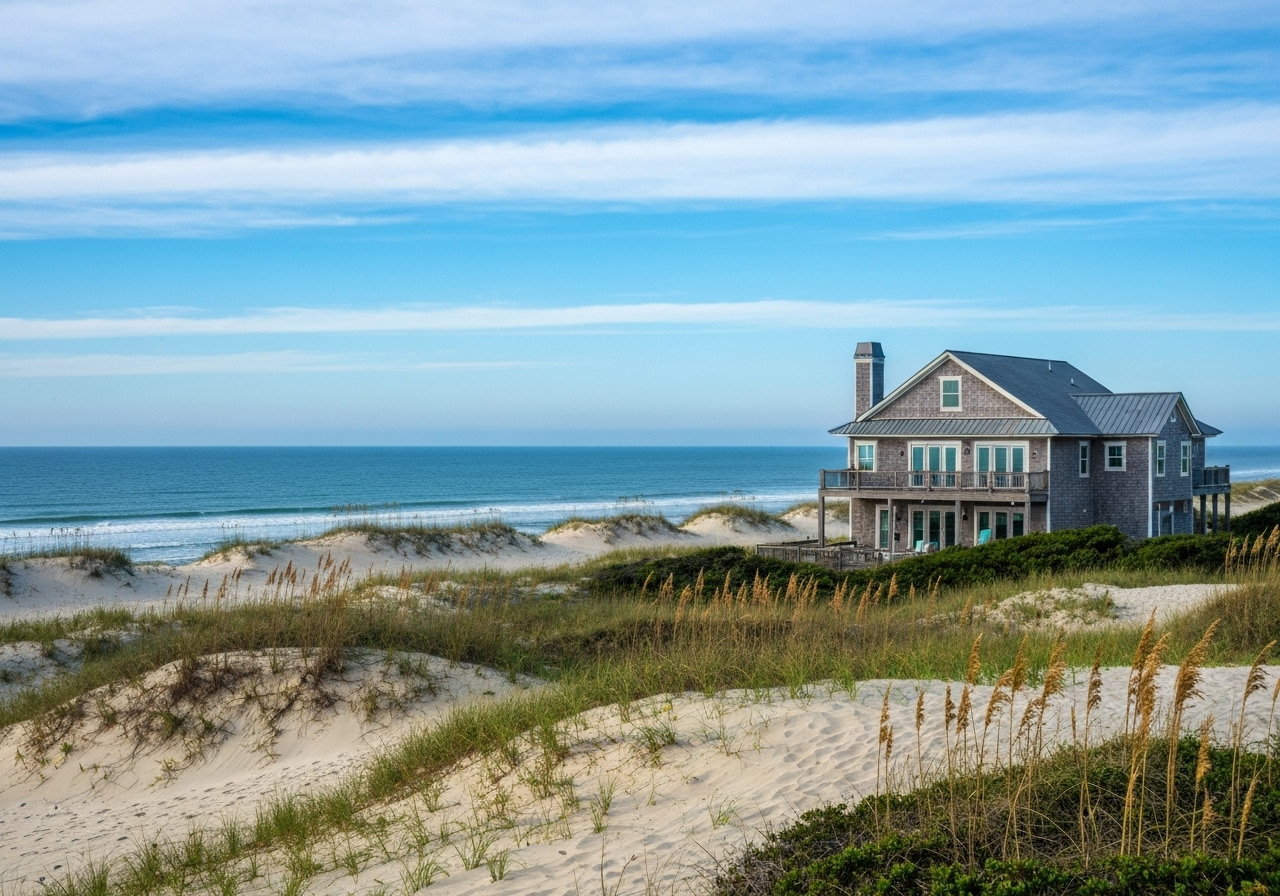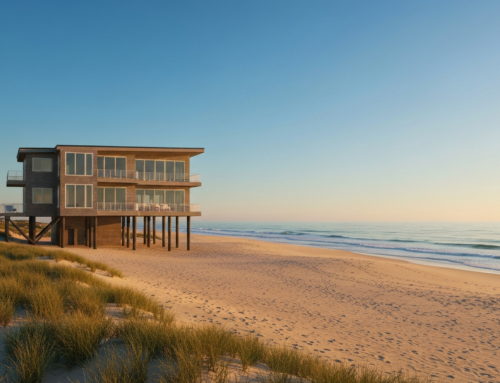Embracing Your North Carolina Coastal Dream
North Carolina’s coastline offers stunning beauty and a unique lifestyle, drawing many to its charming towns and breathtaking ocean views. Owning a home in this picturesque region is a dream for many, but it also comes with distinct considerations, especially regarding protecting your investment. Understanding insurance for North Carolina coastal homes is paramount to enjoying your coastal paradise with peace of mind. The dynamic environment, from serene beaches to the unpredictable force of hurricanes, necessitates specialized coverage that goes beyond standard homeowners policies.
Understanding Essential Insurance for North Carolina Coastal Homes
Standard homeowners insurance policies, often referred to as HO-3 policies, provide broad coverage for your dwelling, personal property, and liability. However, homes situated along the North Carolina coast face increased risks that typical policies often exclude. This is where specialized coverage becomes critical. Coastal homeowners need to be aware of the specific perils that influence their insurance needs:
- Wind and Hail Coverage: Many standard policies in coastal areas exclude or limit damage from wind and hail. Due to the high risk of hurricanes and severe storms, North Carolina coastal homes often require a separate wind and hail policy, or a specific endorsement, usually provided by the North Carolina Joint Underwriters Association (NCJUA) or the North Carolina Insurance Underwriting Association (NCIUA), commonly known as the "Beach Plan" and "Coastal Plan."
- Flood Insurance: This is a separate policy entirely and is never included in standard homeowners insurance. Given the proximity to water, coastal properties are highly susceptible to flooding, even from storms that don’t make direct landfall. Flood insurance, typically offered through the National Flood Insurance Program (NFIP), is a non-negotiable component for true protection.
- Hurricane Deductibles: Unlike standard deductibles, hurricane deductibles are often a percentage of the home’s insured value (e.g., 1% to 5%) rather than a flat dollar amount. This deductible applies specifically to damage caused by named hurricanes. It’s crucial for homeowners to understand how this deductible works and its potential financial impact.
Navigating Unique Coastal Risks: Flood, Wind, and Storm Protection
The North Carolina coast is renowned for its beauty, but it also sits in a prime location for significant weather events. Protecting your home requires a comprehensive strategy that addresses these unique risks.
Flood Insurance: A Must-Have
Even properties not directly on the beachfront can experience significant flooding. Storm surges, heavy rainfall, and overflowing rivers can all contribute to flood damage. The National Flood Insurance Program (NFIP), managed by FEMA, is the primary source of flood insurance. Private flood insurance options are also available and may offer broader coverage or higher limits.
Wind and Hail Coverage Explained
As mentioned, wind and hail damage is a major concern. The NCJUA and NCIUA play a vital role in providing essential coverage when traditional insurers are reluctant to cover properties in high-risk coastal zones. These organizations act as an insurer of last resort, ensuring that homeowners can still obtain critical wind and hail protection.
Understanding Hurricane Deductibles
When a hurricane warning is issued, it’s not uncommon for homeowners to realize the specifics of their hurricane deductible too late. Knowing your hurricane deductible percentage and the corresponding dollar amount for your insured value is essential for financial preparedness. These deductibles are designed to manage the high costs associated with widespread hurricane damage.
Beyond the Basics: Liability and Umbrella Coverage for Coastal Homeowners
While protecting your physical property from natural disasters is crucial, liability protection is equally important. Homeowners insurance policies include liability coverage, which protects you if someone is injured on your property and you are found responsible, or if you cause damage to someone else’s property.
For coastal homeowners, especially those who rent out their properties or entertain frequently, an umbrella insurance policy provides an extra layer of liability protection. An umbrella policy kicks in when the liability limits of your homeowners or auto insurance are exhausted, offering significant additional coverage that can safeguard your assets from substantial lawsuits.
On the Road: Auto Insurance Considerations for Coastal Living
Coastal living often means navigating unique driving conditions and risks. While auto insurance requirements are generally set at the state level, certain aspects become more pronounced in a coastal environment:
- Increased Risk of Weather-Related Damage: Hurricanes and severe storms can lead to downed trees, flooding, and flying debris, all of which pose a threat to vehicles. Comprehensive auto insurance, which covers damage from non-collision events like weather, theft, and vandalism, is highly recommended.
- Road Conditions: Roads near the coast can be susceptible to erosion, sand accumulation, and damage from saltwater, potentially increasing the risk of accidents.
Understanding your liability, collision, and comprehensive coverage, along with uninsured/underinsured motorist protection, ensures you’re well-covered for the unique challenges of coastal driving. Bundling your auto and home policies can often lead to significant savings while providing robust protection.
Securing Your Family’s Future: Life Insurance for Coastal Residents
Beyond protecting your physical assets, securing your family’s financial future is a fundamental aspect of responsible planning, especially for those who have invested in coastal property. Life insurance plays a vital role in this. Whether you choose term life insurance or whole life insurance, the core benefit is providing a financial safety net for your loved ones in the event of your passing.
For coastal residents, life insurance can be particularly important to ensure that significant investments, such as a beach home, can be maintained or passed on without financial burden to beneficiaries. It can cover mortgage payments, ongoing living expenses, and provide for future financial goals, offering invaluable peace of mind.
Choosing Your Expert Coastal Insurance Partner
Navigating the complexities of insurance for North Carolina coastal homes requires expert guidance. The unique risks associated with coastal living, from hurricanes and floods to specialized deductibles, mean that a one-size-fits-all approach to insurance simply won’t suffice.
An experienced insurance partner specializing in coastal properties can help you:
- Assess your specific risk profile based on your home’s location and characteristics.
- Identify the optimal combination of homeowners, flood, and wind/hail policies.
- Explain hurricane deductibles and their potential impact.
- Review liability limits and recommend appropriate umbrella coverage.
- Ensure all your insurance needs, including auto and life, are integrated into a cohesive and cost-effective plan.
Partnering with a local expert ensures you receive personalized advice and comprehensive protection tailored to the distinct demands of living on the North Carolina coast.
Visit our Contact Us page.






